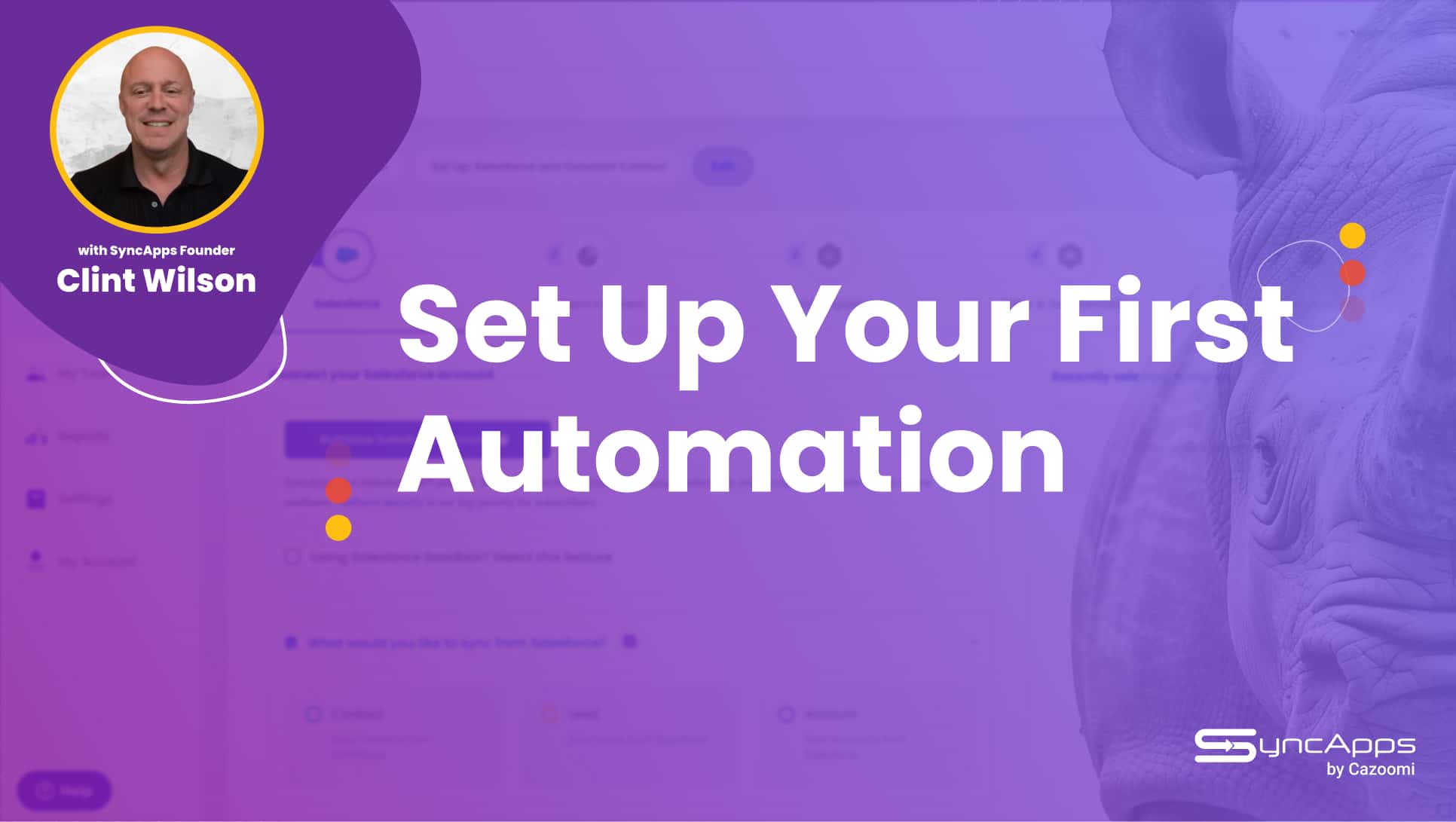Best Salesforce Integration Solutions for Small Businesses

Top 15 Salesforce Integration Solutions for Small Businesses
Salesforce is the world’s leading CRM platform, offering businesses powerful tools to manage customer relationships, sales, and marketing activities. However, small businesses often need more than just a CRM to function optimally.
They require seamless integrations between Salesforce and other essential tools, like email marketing platforms, customer support systems, eCommerce solutions, and accounting software. This is where Salesforce integration solutions for small businesses come in.
These tools help small businesses streamline workflows, automate tasks, and improve overall efficiency, allowing them to focus on growth.
In this article, we’ll explore 15 of the best Salesforce integration solutions for small businesses, breaking down their key features, pros, and cons so you can make an informed decision for your company of who to shortlist.
Before we jump in, a quick primer in case you’re still on the fence about using Salesforce integration solutions for your small business.
Why Do Small Businesses Need Salesforce Integration Solutions?
Small businesses are often working with limited resources, whether it’s time, manpower, or budget.
Not enough staff members? Or money to grow your team? Then rely on automation and integration!
Salesforce integration solutions offer small businesses the opportunity to:
- Save time: by automating routine tasks, such as data entry, integrations reduce human error and free up valuable time for employees to focus on more critical tasks.
- Improve customer experience: Salesforce integrations enable businesses to have a 360-degree view of their customers by connecting data from various platforms, leading to improved decision-making and personalized customer experiences.
- Boost productivity: instead of switching between different platforms, you can access all your essential data within Salesforce, streamlining workflows and improving overall productivity.
- Enhance scalability: small businesses need flexible solutions that can grow with them. Integrating Salesforce with other systems makes it easier to scale operations as the business grows without outgrowing technology.
- Reduce costs: by automating processes and reducing the need for manual intervention, small businesses can lower operational costs and improve efficiency.
Now that we’ve outlined the benefits, let’s dive into 15 of the best Salesforce integration solutions for small businesses.
Top 15 Salesforce Integration Solutions for Small Businesses
Want to integrate Salesforce with your other mission-critical applications but don’t know where to start? We’ve got you covered!
Keep reading to get the full list of integration solutions tailored for small businesses, along with the pros and cons for each of them — so you can make an informed decision.

We built SyncApps as a manifesto for the democratization of data. Back then, integration was reserved to large corporations with huge budgets. We knew we could empower small businesses like yours with affordable integration for Salesforce, so we rolled our sleeves.
Today, SyncApps is the preferred Salesforce integration solution for small businesses for a few reasons: 24/7 support with real humans, flexibility, affordability, and, last but not least, a robust solution.
Key Features as a Salesforce Integration Solution for Small Businesses
- Seamless integration between Salesforce and dozens of other applications.
- Real-time sync to keep data up to date across all platforms.
- No coding required, making it easy for non-technical users.
- Custom field mapping for precise data synchronization.
Pros
- Ease of use: SyncApps is beginner-friendly, with a simple setup process.
- Affordable: SyncApps offers competitive pricing, making it accessible for small businesses.
- 24/7 support with real humans: we offer customer support tailored to small businesses, ensuring they can resolve any integration issues quickly.
Cons
- No free plan: we no longer offer a free plan, but an extensive 28-day free trial.
Take your small business to the next level. Start integrating Salesforce with your mission-critical software today.

Zapier is a popular integration platform that connects Salesforce and over 3,000 applications, automating workflows between tools without needing any coding expertise. It’s ideal for small businesses looking for a simple, cost-effective solution to connect Salesforce with other apps like Gmail, Slack, or Google Sheets.
Key Features as a Salesforce Integration Solution for Small Businesses
- Supports a wide range of Salesforce integrations.
- Easy-to-use interface with pre-built “Zaps” (automations).
- Automates routine tasks, reducing manual effort.
Pros
- Ease of use: no coding required, making it perfect for non-technical users.
- Wide range of integrations: integrates with almost any tool a small business might need.
- Scalable: small businesses can scale their workflows as they grow, adding more integrations when necessary.
Cons
- Limited advanced functionality: for complex integrations or custom workflows, Zapier may not be as powerful as other solutions.
- Cost: pricing can increase rapidly as more Zaps and workflows are added.

Workato is a robust automation platform that integrates Salesforce with various cloud and on-premise applications. It’s designed for small businesses that need to automate business processes across multiple platforms, such as Salesforce, Slack, and QuickBooks.
Key Features as a Salesforce Integration Solution for Small Businesses:
- Pre-built connectors for Salesforce and over 400 other apps.
- AI-driven automation for smart workflows.
- Scalable for businesses of all sizes, from startups to enterprises.
Pros
- Advanced automation: allows for complex, multi-step workflows with intelligent automation.
- Real-time data sync: ensures data across platforms is always up to date.
- User-friendly interface: despite its powerful features, Workato remains accessible to non-developers, at least for basic automation.
Cons
- Pricing: Workato’s pricing can be on the higher side for small businesses with limited budgets.
- Learning curve: while user-friendly, setting up more advanced workflows may require some technical knowledge.
No technical knowledge? No problem! Integrate Salesforce with your other software with zero coding skills. At SyncApps, you have a true user-friendly interface. Plus, our 24/7 support department will help you get started in minutes.

Tray.ai is an integration platform that empowers small businesses to automate Salesforce processes with a visual workflow builder. It’s great for creating complex, customizable integrations between Salesforce and other platforms, such as Shopify, HubSpot, and Jira.
Key Features as a Salesforce Integration Solution for Small Businesses
- A powerful drag-and-drop builder for designing custom workflows.
- Pre-built Salesforce connectors for fast integration setup.
- Real-time error monitoring and troubleshooting.
Pros
- Highly customizable: offers more advanced workflow automation options than other platforms.
- User-friendly interface: the drag-and-drop builder makes it easy for non-technical users to build integrations.
- Great for growing businesses: Tray.ai is scalable and can grow with a small business as its needs evolve.
Cons:
- Cost: Tray.ai’s pricing can be a bit steep for very small businesses.
- Complexity: the wide range of customization options may feel overwhelming to some users without technical experience.

MuleSoft is an enterprise-grade integration platform that can be used by small businesses that anticipate rapid growth. MuleSoft connects Salesforce with various systems, both on-premises and in the cloud, offering deep customization options and scalability.
Key Features as a Salesforce Integration Solution for Small Businesses:
- Pre-built Salesforce connectors for seamless integration.
- Supports both cloud-based and on-premise apps.
- API-led connectivity for flexibility and scalability.
Pros
- Extremely powerful: MuleSoft offers enterprise-level features, which means it can handle even the most complex integration needs.
- Highly customizable: businesses can create intricate workflows and custom connectors.
- Scalable: suitable for growing businesses that expect to scale rapidly.
Cons
- Steep learning curve: the platform is complex, and smaller businesses may struggle without dedicated IT support.
- Expensive: MuleSoft’s pricing structure is tailored for enterprise clients, making it less affordable for smaller businesses.

Make (formerly Integromat), is a visual integration platform that allows small businesses to automate workflows between Salesforce and other apps like Google Workspace, Dropbox, and Trello.
Key Features as a Salesforce Integration Solution for Small Businesses:
- Visual workflow builder for easy automation design.
- Pre-built templates to simplify integration setup.
- Supports complex logic and multi-step workflows.
Pros
- Visual interface: the drag-and-drop design makes it easy to build workflows.
- Flexible pricing: Make offers affordable plans for small businesses.
- Complex automation: allows for intricate, multi-step workflows with conditional logic.
Cons
- Steeper learning curve: while the visual builder is user-friendly, some users may need time to fully understand all of its features.
- Support: some users report that Make’s customer support could be more responsive, which might be challenging for small businesses needing quick assistance.

Boomi is a cloud-based integration platform that connects Salesforce with a wide range of applications. It is ideal for small businesses looking for a scalable solution that can handle growing data volumes and complex workflows.
Key Features as a Salesforce Integration Solution for Small Businesses:
- Pre-built connectors for Salesforce and other business apps.
- Low-code platform with a drag-and-drop interface.
- Advanced analytics to track integration performance.
Pros
- Scalable: Boomi is designed to scale with your business as it grows.
- User-friendly interface: the low-code platform makes it easy for non-developers to set up integrations.
- Reliable performance: Boomi offers high reliability and performance for even the most complex workflows.
Cons:
- Pricing: the platform can be expensive for small businesses, especially as they scale.
- Complexity: while the interface is user-friendly, setting up complex integrations may still require some technical expertise.

Jitterbit is a powerful integration platform that simplifies the process of connecting Salesforce with other business applications. It’s suitable for small businesses that need a robust and flexible solution for real-time data synchronization.
Key Features as a Salesforce Integration Solution for Small Businesses:
- Pre-built templates for Salesforce integration.
- AI-driven data mapping for faster integration setup.
- Supports both cloud and on-premise apps.
Pros
- Fast implementation: Jitterbit offers quick integration setup with its pre-built templates.
- AI-powered: the platform uses AI to automate and optimize data mapping.
- Real-time sync: ensures that your Salesforce data is always up-to-date across all platforms.
Cons
- Complex for beginners: the advanced features may require some technical knowledge to utilize fully, so this is a good Salesforce integration solution for small businesses in the tech space.
- Cost: Jitterbit’s pricing can be a bit high for small businesses with limited budgets.

Pabbly Connect is an affordable and easy-to-use platform designed to automate workflows between Salesforce and other applications. With a simple setup process and a wide range of integrations, it’s ideal for small businesses that need to create quick and efficient workflows.
Key Features as a Salesforce Integration Solution for Small Businesses
- Supports over 2000+ integrations, including a few dozen for Salesforce.
- No monthly limits on automation tasks in paid plans.
- Provides real-time data sync and batch data processing.
Pros
- Affordable: Pabbly Connect’s pricing is more accessible compared to some of the other tools on this list, making it ideal for small businesses.
- Unlimited workflows: the absence of limits on automation tasks is perfect for businesses that require frequent data syncing.
- User-friendly: It’s easy to set up and use, even for non-technical users.
Cons
- Limited advanced features: while Pabbly Connect is simple to use, it doesn’t offer as many advanced customization options as some other platforms.
- Smaller integration ecosystem: Although it supports over 2000 integrations, its integration ecosystem is still smaller compared to some competitors.
- No support: to keep costs down, Pabbly doesn’t offer much support. If your small business doesn’t have an in-house tech team, we advise you to use another solution on this list.

Celigo is a robust integration platform that automates business processes across multiple applications, including Salesforce. With pre-built connectors and powerful automation capabilities, it’s ideal for small businesses that need to integrate Salesforce with accounting, ERP, or eCommerce systems.
Key Features as a Salesforce Integration Solution for Small Businesses
- Pre-built Salesforce connectors for fast integration.
- Advanced error handling and monitoring for integrations.
- AI-driven automation to improve data accuracy.
Pros
- Powerful automation: Celigo allows businesses to automate even complex workflows across multiple apps.
- Pre-built templates: the platform offers pre-built integrations for common use cases, reducing setup time.
- Real-time data sync: ensures that your Salesforce data is always up to date.
Cons
- Pricing: Celigo’s advanced features come at a cost that might be too high for very small businesses.
- Complex setup: while it offers pre-built connectors, customizing them for specific needs can require some technical knowledge.

Skyvia is a cloud-based data integration platform that connects Salesforce with various databases, cloud apps, and on-premise systems. It’s ideal for small businesses that need to sync Salesforce with databases, automate ETL (Extract, Transform, Load) processes, or perform data replication.
Key Features as a Salesforce Integration Solution for Small Businesses
- Supports a wide range of apps and databases.
- Simple, no-code integration process.
- Backup and data migration options for Salesforce.
Pros
- No-code platform: Skyvia is designed for non-technical users, making it easy to set up integrations without any coding.
- Affordable pricing: it offers competitive pricing, making it a good fit for small businesses.
- Backup options: Skyvia provides backup and restore functionality for Salesforce, adding an extra layer of security.
Cons
- Limited advanced features: while Skyvia is great for basic integrations, it may not have all the features needed for more complex workflows.
- Support: some users report slower response times from the customer support team.

DBSync is a robust integration solution specifically designed to connect Salesforce with accounting, ERP, and other business applications. It’s ideal for small businesses that need to integrate Salesforce with QuickBooks, Microsoft Dynamics, or NetSuite.
Key Features as a Salesforce Integration Solution for Small Businesses
- Pre-built Salesforce connectors for accounting and ERP systems.
- Real-time data sync between Salesforce and financial systems.
- Custom field mapping and workflow automation.
Pros
- Accounting integration: DBSync specializes in syncing Salesforce with accounting systems, making it ideal for small businesses.
- Real-time sync: keeps Salesforce data updated in real-time across connected apps.
- Custom workflows: offers advanced workflow customization for tailored integrations.
Cons
- Complex setup: initial setup can be challenging for users without technical experience.
- Pricing: DBSync can be on the pricier side, especially for small businesses with basic integration needs.

Commercient is an integration platform designed to connect Salesforce with ERP systems like NetSuite, Sage, QuickBooks, and Microsoft Dynamics. For small businesses, especially those managing sales and inventory, Commercient provides seamless data synchronization between Salesforce and ERP, eliminating the need for manual data entry.
Key Features as a Salesforce Integration Solution for Small Businesses
- Bi-directional data sync between Salesforce and ERP systems.
- Pre-built ERP connectors for fast integration.
- Supports real-time and batch data sync.
Pros
- ERP-focused: it’s a great solution for businesses that rely on both Salesforce and ERP systems to manage operations.
- Real-time sync: keeps sales and financial data up to date, improving accuracy.
- Pre-built connectors: quick and easy to set up with pre-built connectors for popular ERP systems.
Cons
- Pricing: Commercient can be more expensive than other integration solutions, particularly for small businesses with a limited budget.
- Limited non-ERP integrations: while it excels at ERP integration, it may not have the same breadth of support for non-ERP apps compared to other platforms.

Informatica is a robust integration platform designed to handle both cloud and on-premise data integration. It’s ideal for small businesses with complex data integration needs, including connecting Salesforce with ERP, CRM, and other systems.
Key Features as a Salesforce Integration Solution for Small Businesses
- Offers pre-built connectors for Salesforce and other popular business apps.
- Data management features, including data cleansing and transformation.
- Secure, cloud-based architecture with scalability options.
Pros
- Advanced data management: Informatica is ideal for small businesses that need to ensure clean, accurate data across all platforms.
- Pre-built connectors: offers a wide range of pre-built connectors, reducing the time to integrate Salesforce with other systems.
- Scalable: designed to grow with your business, supporting small businesses and enterprises alike.
Cons:
- Steep learning curve: due to its advanced features, Informatica can take time to master.
- Expensive: Informatica is more expensive than some other platforms, making it a consideration for small businesses with larger budgets.

Nintex is a workflow automation platform that allows small businesses to integrate Salesforce with various apps and automate business processes. With a focus on process automation, it’s a great tool for small businesses looking to streamline workflows across their organization.
Key Features as a Salesforce Integration Solution for Small Businesses
- Advanced workflow automation with Salesforce.
- Supports both on-premise and cloud-based apps.
- Drag-and-drop interface for building workflows.
Pros
- Advanced workflow automation: Nintex excels at automating business processes, making it perfect for small businesses looking to improve efficiency.
- User-friendly interface: the drag-and-drop builder is easy to use, even for non-technical users.
- Scalable: Nintex is designed to grow with your business, making it a good long-term investment.
Cons
- Pricing: Nintex’s pricing can be high, particularly for small businesses with limited budgets.
- Complexity: setting up more advanced workflows may require some technical expertise.
Conclusion: How to Choose the Best Salesforce Integration Solution for Small Businesses
It’s not an easy task, right? These 15 Salesforce integration solutions all have their ups and downs.
To make things even more complicated, there’s no secret recipe or a single tool that fits the needs of every small business. Our advice?
Test before you buy.
Most of these tools offer a free trial, so take them for a spin and see if they live up to their promises, especially support.
No time to test all these Salesforce integration solutions for small businesses? Start with the one most SMEs rave about!




